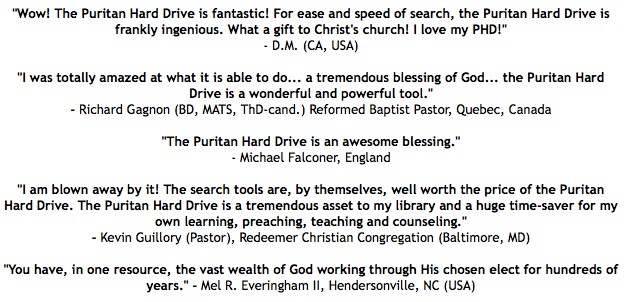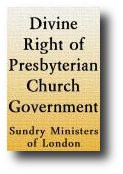 Loading... Please wait...
Loading... Please wait...- SWRB Home
-
Free Resources
- Short Listings Of Free Reformation & Creation Resources
- Free Reformed, Puritan, Covenanter and Creationist Videos
- Thousands of Links to Free Audio, Video and Printed Resources
- Free Puritan Books, Reformed MP3s, and Calvinist Videos
- Puritan Quotes, Free Reformation MP3s, Reformed Books and Calvinist Videos From PuritanDownloads.com On FaceBook
- Shipping & Returns
- Blog
- Privacy Policy
- Contact Us
- Payment Options
- Help
-
About Us
- Sitemap
Pastor Scott Brown, on the left in the video above, is the Director of the National Center for Family-Integrated Churches (NCFIC)
Resource Categories
- PURITAN HARD DRIVE REVIEWS
- PASTOR ROB VENTURA ON THE PURITAN HARD DRIVE
- DR. VODDIE BAUCHAM, JR. ON THE PURITAN HARD DRIVE
- R. C. SPROUL ON SWRB
- DR. JOEL R. BEEKE ON THE PURITAN HARD DRIVE
- PASTOR GREG L. PRICE ON THE PURITAN HARD DRIVE
- DR. MATTHEW MCMAHON ON THE PURITAN HARD DRIVE
- PASTOR SCOTT BROWN ON THE PURITAN HARD DRIVE
- PASTOR W. J. MENCAROW ON THE PURITAN HARD DRIVE
- JOAQUIN FERNANDEZ ON THE PURITAN HARD DRIVE
- PASTOR DAVID SILVERSIDES ON THE PURITAN HARD DRIVE
- JOHN HENDRYX ON THE PURITAN HARD DRIVE
- PASTOR KEVIN GUILLORY ON THE PURITAN HARD DRIVE
- RICHARD BENNETT ON THE PURITAN HARD DRIVE
- DR. KENNY RHODES ON THE PURITAN HARD DRIVE
- JUSTIN RAWSON ON THE PURITAN HARD DRIVE
- PASTOR JAMES WALLACE ON THE PURITAN HARD DRIVE
- PASTOR RICHARD GAGNON ON THE PURITAN HARD DRIVE
- PASTOR JOE HAYNES ON THE PURITAN HARD DRIVE
- DR. STEVEN DILDAY ON THE PURITAN HARD DRIVE
- PASTOR ANDREW COMPTON ON THE PURITAN HARD DRIVE
- TERENCE ELLARD ON THE PURITAN HARD DRIVE
- PASTOR JERRY JOHNSON ON THE PURITAN HARD DRIVE
- PASTOR DAVID PETRIE ON THE PURITAN HARD DRIVE
- JIM DODSON ON THE PURITAN HARD DRIVE
- PASTOR BRIAN SCHWERTLEY ON THE PURITAN HARD DRIVE
- PASTOR PHIL GIBSON ON THE PURITAN HARD DRIVE
- MEL R. EVERINGHAM II ON THE PURITAN HARD DRIVE
- PAUL BLYTH ON THE PURITAN HARD DRIVE
- STEVE KETTLER ON THE PURITAN HARD DRIVE
- D. M. (CALIFORNIA) ON THE PURITAN HARD DRIVE
- MICHAEL CAUGHRAN ON THE PURITAN HARD DRIVE
- WIILIAM NOPPER IV ON THE PURITAN HARD DRIVE
- LINDA THERIAULT ON THE PURITAN HARD DRIVE
- WILLIAM WARNOCK ON THE PURITAN HARD DRIVE
- ROBERT KOH ON THE PURITAN HARD DRIVE
- WHAT'S ON THE PURITAN HARD DRIVE?
- ALL PURITAN HARD DRIVE VIDEOS
- PHD-ODE INSTALLATION VIDEOS
- COMMENTS ON SWRB
- ALL PURITAN QUOTE VIDEOS
- PURITAN HARD DRIVE SCREENSHOTS
- PURITAN HARD DRIVE MINISTRY AND DONATION OFFERS
- TABLE OF RESOURCE CATEGORIES
- Advanced Studies
- SWRB SERMONAUDIO MOBILE APP
- Apologetics
- Assurance
- Attributes and Holiness of God
- Augustine
- Banner of Truth
- Baptism
- Beginners
- Bibles (Geneva, KJV, Hexapla, etc.)
- Biblical Counseling
- BIBLICAL HD COLLECTION
- Biblical Interpretation (Hermeneutics)
- Biographies and Autobiographies
- Calvinism and the Sovereignty of God
- CALVINISM HD COLLECTION
- CALVINIST CLASSICS HD COLLECTION
- Charles Spurgeon
- Children's Books
- CHRISTIAN EDUCATION HD COLLECTION
- Christian History
- Church Government
- Civil Government and Resistance
- CLASSIC CHRISTIAN HD COLLECTION
- Classic Puritan and Reformed Sets
- Commentaries
- Contemporary Issues
- Covenant Theology and Covenanting
- COVENANTER HD COLLECTION
- Covenanters and Covenanted Reformation
- Creation and Creationism
- Creeds, Confessions and Covenants
- Cults, False Religions, Psychology, Humanism
- Dealing with Affliction, Suffering, and Sickness
- Debates
- Dutch Reformed
- Education and Home Schooling
- English Puritans, Covenanters and Reformers
- Family, Children, Home, and Family Worship
- First Reformation
- Five Points of Calvinism (TULIP)
- For Pastors and Elders
- For Seminary Students
- FREE PURITAN & REFORMATION MP3 AUDIO SERMONS/BOOKS
- FREE PURITAN BOOKS, REFORMATION MP3s, PDFs, VIDEOs
- George Gillespie
- God's Law, The Ten Commandments, etc.
- Greg L. Price on Headcoverings
- Heaven, Hell and the Final Judgment
- Holy Days (Lord's Day, Christmas, Easter, etc.)
- HOME SCHOOL HD COLLECTION
- Intermediate Studies
- John Bunyan
- John Calvin
- John Knox
- John Owen
- Jonathan Edwards
- Justification
- Languages, Dictionaries, Reference, etc.
- LOOK WHO LOVES THE PURITAN HARD DRIVE
- Lord's Supper (Communion)
- Marriage, Courtship, etc.
- Martin Luther and Lutheranism
- Martyrs and Persecution
- Other Protestant Works
- Predestination and Providence
- PRESBYTERIAN HD COLLECTION
- Presbyterians and Presbyterianism
- Prophecy, Antichrist, and Eschatology
- PROTESTANT HD COLLECTION
- PSALM SINGING MP3s (COMPLETE SET)
- Psalters, Psalm Singing and Music
- Puritan Facts
- PURITAN FAST SERMONS (1640-1653) - 34 VOLS SET
- Puritan Fast Sermons 1640-1653
- Puritans and Puritanism
- PURITAN HARD DRIVE
- REFORMATION HD COLLECTION
- Reformation History
- Reformed and Puritan Classics
- Reformed Baptist
- REFORMED BAPTIST HD COLLECTION
- REFORMED HD COLLECTION
- REFORMED PRESBYTERIAN HD COLLECTION
- Reformed Presbytery, RPNA Protesters, etc.
- Reformed Theology
- Reformed Worship, The Regulative Principle, etc.
- Roman Catholicism, the Jesuits, Islam, etc.
- Salvation and Evangelism
- Samuel Rutherford
- Sanctification, Prayer and Holiness
- Scottish Covenanters
- Scottish Presbyterianism
- Scripture Song MP3s (Psalms and Bibles Verses)
- Second Reformation
- Separation, Unity, Uniformity, etc.
- Sermons and Sermon Collections
- Solemn League and Covenant
- Theology and Doctrine
- Third Reformation
- Thomas Watson
- Westminster Confession, Assembly and Divines
- Authors (All A to Z)
Phone Orders:
(780) 450-3730
To obtain free Reformation books, Puritan MP3s and Calvinistic videos, SWRB discount coupons, etc., add yourself to SWRB's Puritan and Reformed email list by using the form above.
The Divine Right of Church Government (Jus Divinum Regiminis Ecclesiastici)... by Sundry Ministers of London
Resource Details
Resource Description
The Divine Right of Church Government (Jus Divinum Regiminis Ecclesiastici), Wherein it is Proved that the Presbyterian Government, By Preaching and Ruling Elders, in Sessional, Presbyterial, and Synodical Assemblies, May Lay the Only Lawful Claim to a Divine Right, According to the Holy Scriptures, c. 1646, 1844 ed.
This is one of the all time classic defenses of the divine right of Presbyterianism.
It also gives us a clear picture of the original intent of the English Presbyterians working at the Westminster Assembly (and is therefore very useful in determining the original intent of the Westminster Confession itself). It can be seen here that it was the strong conviction of the majority of English divines at Westminster that Presbyterianism is the only form of church government that is instituted by God in His Word.
David Hall, (the editor of the Naphtali Press edition), states, the book "was not written as a polemical tract, as if to prop up some moribund tradition; rather it is an exemplar of gentle and reasoned discourse."
Published anonymously, during the sitting of the Westminster Assembly, because of the Erastian leaning Parliament's "gag rule," this work is considered by some as "an even truer record of the Westminster divines' views of government than the final (politically suppressed) standards" (Coldwell, Naphtali Press edition).
Moreover, Hall goes so far as to state that "perhaps no single work is as illuminating for original intent [of the Westminster Standards] as this rare work printed contemporaneously with the meeting of the Assembly;" and that "acquaintance with the political and ecclesiastical events of the time narrows down the possible authorship of this (book -- RB) to either (the) Westminster divines themselves, or sympathizers of the Westminster Assembly of divines (p. xvi).
Hall also notes that Hetherington (in his masterful History of the Westminster Assembly, p. 270) asserts that this book was the Westminster divine's answer to the English parliament's "nine queries" that were intended "to discourage their thoroughly Presbyterian views."
Hall continues,
"In the first comprehensive Scottish history of the Assembly, William Hetherington concludes safely: 'Judging from internal evidence, in matter, manner, and style, it appears most certain that this work at least embodies the substance of the answer prepared by the Assembly, somewhat enlarged and modified by the city ministers in whose name it was published.'
Although Hetherington (who in a footnote wished for the reprinting of this very work as 'a very valuable contribution to the Presbyterian cause in the present day') initially infers that the work of the Assembly and the London ministers was merged, such that 'so much of the one was transfused into the other as to render then to all practical intents one work,' at the conclusion of his history he concludes with more certainty: 'The Jus Divinum of the city ministers appears to me to be both virtually and substantially the Assembly's Answer to the Parliament, containing actually that very Answer as prepared by them; but with such additional amplifications in statement and illustrations, by the city ministers themselves, as might both render it more complete and fit for publication as a distinct work on the subject, and at the same time entitle them to publish it on their own responsibility'" (Hall, pp. xviii-xix, citing Hetherington, History of the Westminster Assembly pp. 270, 362).
Furthermore,
"not only do we have confirmation from numerous sources that the 2 December 1646 Jus Divinum reflects the Assembly's original intent, we also see along with that the undisputable historical notation that the Assembly considered itself bound by a jus divnum, not merely 'guided' by a nebulous jus hamanum. The difference is cataclysmic" (Hall, p. xxii).
In The Divine Right of the Gospel Ministry these same authors later give us a glimpse of how different their jus divinum presbyterianism is from much of what "presbyterians" today believe. "So strongly were they committed to this thorough-going jus divinum view that they stated the following 'four things that justly deserve to be abhorred by all good Christians:
- 1. An Universal Toleration of all Religions
- 2. An Universal Admittance of all men to the Lord's Supper
- 3. Universal Grace, that is, that Christ died equally for all, and that all men have free-will to be saved
- 4. Universal Allowance of all that suppose themselves gifted to preach without Ordination" (Hall, p. xxi).
This edition contains the appendix which sets forth, "Extracts from some of the best authors who have written on church government, concerning the scriptural qualifications and duties of church members; the sole right of gospel ministers to preach the gospel; the people's divine right to choose their own pastors; together with an abstract of the arguments of the great Dr. Owen (though a professed 'Independent' at the time) in favour of the Divine right of the office of the ruling elder."
This edition also includes a preface, "The Editor to the Reader," written by the Cameronian "T.H" (Thomas Henderson) -- an Irish Reformed Presbyterian who was also the author to the forward of James Douglas' Strictures on Occasional Hearing.
Henderson recommends this volume as "one of the best defences of presbytery which he has ever seen."
All resources for sale on this website, with the exception of Scottish Metrical Psalms MP3s, are available on the Puritan Hard Drive .
VIDEO INTRODUCTION TO THE PURITAN HARD DRIVE


Phone Orders:
(780) 450-3730
To obtain free Reformation books, Puritan MP3s and Calvinistic videos, SWRB discount coupons, etc., add yourself to SWRB's Puritan and Reformed email list by using the form above.








































